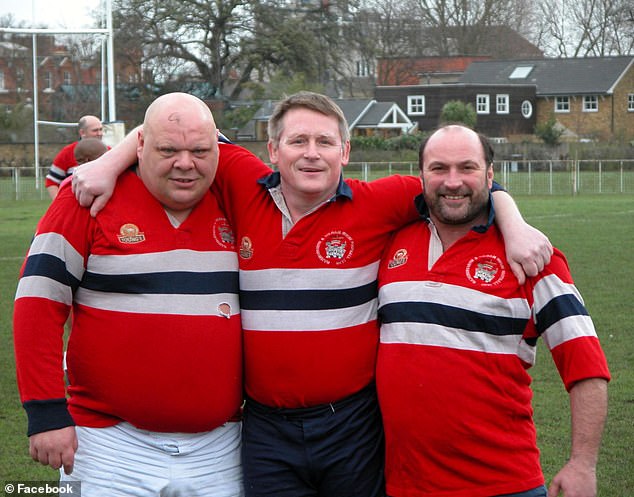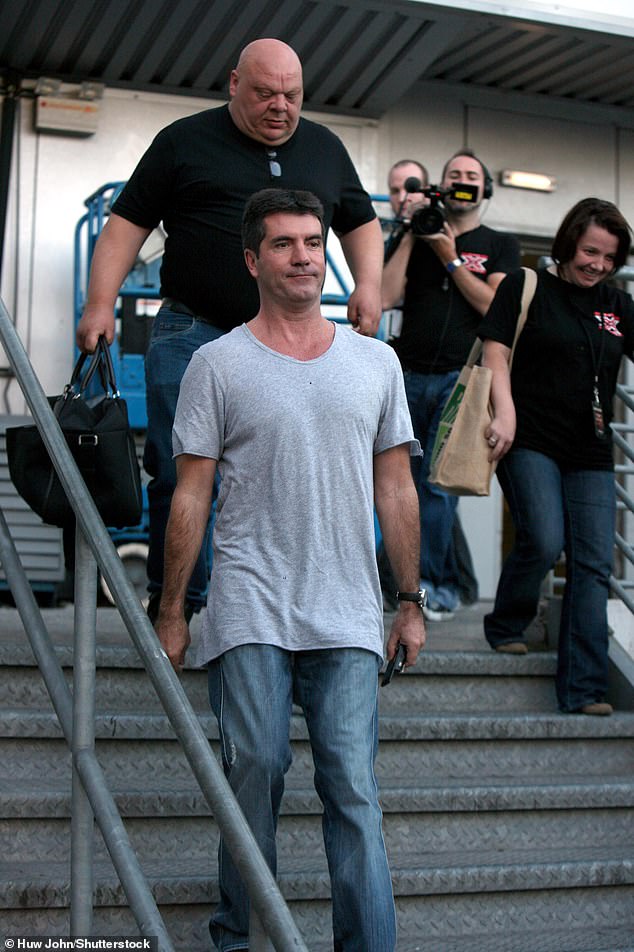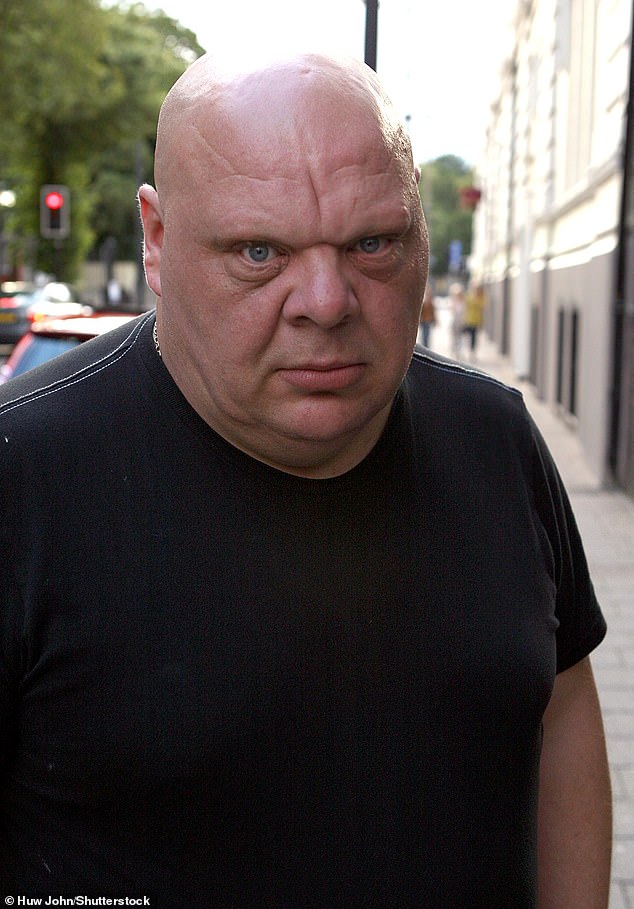An X Factor legend has died at the age of 64 after working closely with Simon Cowell on the show for eight years.
Bodyguard Tony Adkins – who was known as Big Tony – died on Easter Sunday while on a rugby tour, a family member confirmed on social media.
Tony worked closely with Simon as a bodyguard on the ITV show, and also played a giant in Harry Potter and the Deathly Hallows: Part Two in 2011.
Sharing a photo of Tony, his cousin wrote: ‘It is with great sadness my family would like to announce that my Cousin Big Tony, Simon Cowell’s ex bodyguard, passed away on Easter Sunday while on a Rugby Tour.
‘He was a loveable Rogue and will be missed very much, RIP Big T.’
Hammersmith and Fulham RFC also shared their own tribute to Tony on Facebook, writing: ‘It is with immense sadness that Hammersmith & Fulham RFC pays tribute to a true gent and great Hammer, Tony Adkins, who passed away on Easter Sunday whilst on tour with the Club in Poland.

Bodyguard Tony Adkins, who worked on The X Factor for eight years, has died at the age of 64 (pictured playing for Hammersmith and Fulham RFC)

Known as Big Tony, the bodyguard and actor worked with Simon Cowell on the ITV show. He died on Easter Sunday during a rugby tour in Poland, his cousin shared on social media
‘Tony was a Hammers’ man in every sense of the word, joining the club some 40 years ago alongside Henry Compton School contemporaries and fellow Hammers legends Ray Bateman, Dick Wayman, Pascal Peters, Dave Clark, and teachers Martin Williams, Ed Naylor, Doug Bone, and John Mathewman.
‘A tight head prop by trade, Tony could be still found pulling on the boots well into the 2000s, and even featured in the club’s 25th anniversary game.
‘Tony was, at heart, a touring Hammer, and he liked nothing more than taking the Hammers brand of Rugby beyond the boundaries of London.
‘He represented the club all over Britain and Europe, starting with his first tour in Brixham and going on to earn touring badges from places as far afield as Barcelona, Prague and Amsterdam.
‘While his loss is hard to bear, it brings some comfort to those that knew him that he passed while doing what he loved – touring with the boys.
‘More than a Rugby player, Tony found a niche later in life under the bright lights, serving as a long-time bodyguard for Simon Cowell during his time on X-factor, and featuring in the Harry Potter franchise as a giant, which all agreed was fitting.
‘His friendliness and generosity will be missed by all who knew him, and our thoughts are with his family. Vale Tony.’
After leaving his job as a bodyguard on The X Factor, Tony shared insight into working with the music mogul in an interview with The Mirror.

Tony worked closely with Simon as a bodyguard on the ITV show, and also played a giant in Harry Potter and the Deathly Hallows: Part Two in 2011
He said: ‘Simon was so laid-back and a very nice guy.
‘He was generous, too. Whenever the show finished – and at Christmas – you’d get an envelope as a thank you. The last one I got had £700 stuffed in it.
‘He’s a very private person. He doesn’t give much away. You never see him drunk or out of control.’
Tony went onto reveal that Simon was ‘vain’ and would ‘do his hair’ during an break from filming.
Several former X Factor contestants have come out and slammed the show in recent years, including Katie Waissel, Rebecca Ferguson, Cher Lloyd and Jedward.
In October, former winner Matt Terry slammed the show, saying he hopes it ‘never’ returns to screens and it’s ‘not good for people’.
The singer won the thirteenth series of the ITV show in 2016 and signed to Simon Cowell’s label Syco shortly thereafter.
But fame doesn’t come easy for many of the show’s participants with Matt claiming some ex-contestants still struggle with it today, six years after the show ended.
Asked if he thinks the show should come back, he told MailOnline: ‘Never! It’s not good – it’s not good for people. I’m strong, and I know how I dealt with it.
‘You go in there and you’re built up, and I was a waiter beforehand, so I’d never done anything of the sort, and you’re kind of thrust in.
‘If X Factor comes back, I just hope they put some sort of psychological moment in for people. There are people who have come years before me, that are still confused and struggle with their identity.
‘I’m just so happy I got to a place where I feel like, you know what, I did it, it’s part of my story, but it’s not all of me. I can’t let this one thing define me.’
Matt, who released his debut album Trouble in 2017, told how he struggled to adjusted to fame after the show.
He also found there was ‘no support’ when the series ended and he ‘struggled’ after.
He said: ‘For me it felt like I’d finished the show, and off you go into the big wide world, on your own. There was no support, and I just didn’t realise it.
‘When I came off the show, it changed my life, and it opened many doors, but I struggled definitely. Afterwards, there wasn’t anyone there to help me.
‘I’m grateful that I’ve got a good set of friends and solid family, which is lucky because not everybody has that, to say, ‘You’re human, you’re fine, you’re not just an X Factor winner, but you’re also Matt Terry, the person.’
A spokesperson for The X Factor told MailOnline: ‘We take the welfare of everyone involved in our shows extremely seriously and during Matt’s time on the show in 2016, there were robust measures in place to ensure everyone involved in the making of the programme was supported throughout their experience and beyond.
‘Including a dedicated welfare team made up of psychologists, doctors, welfare producers and independent legal and management advisors with no time limit on aftercare once the show had aired.
‘These measures were under constant review, and we have always been proactive in adapting and updating them for future series to reflect the requirements of the show.’
MailOnline understands that a psychologist was present at all judge auditions, bootcamp and key stages in the competition and a doctor was on hand to supervise the screening of participants for welfare concerns and provide support across the series.
A dedicated welfare producer was present at the participant house and in the studios acting as the day-to-day contact for the participants and medical or psychological support provided was on a confidential basis.
Matt also spoke about Lucy Spraggan who left The X Factor in 2012 after she was raped by a hotel porter while taking part on the show.
Matt said: ‘It shocked me, and it also proves how far it has come along. That wasn’t happening when I was on [the show], so if it does come back, and I hope it doesn’t for the contestants’ sake.’
Former X Factor contestant Katie Waissel previously said the show ‘ruined’ her life.
Throughout the course of the singing competition, Waissel said she received acid attack and death threats, and suffered both panic attacks and suicidal thoughts.
The singer said she has since sought therapy for post-traumatic stress disorder following her time on the show.
She also founded the OWHL Foundation to help others who have experienced a similar situation to her. On its website, the foundation says it aims to ‘oversee the welfare, human rights and liberty within the creative industry sector’.
Looking back through contracts she signed during her time on the X Factor, she told the Times: ‘There are so many of us who have been so trapped and it’s not fair, there was a huge imbalance in power.’
Cher Lloyd, who finished fourth in the 2010 edition of X Factor, claimed she was ‘sold a dream’ when appearing on the show at 17, before being exploited.
In a duet shared on TikTok, she sang: ‘How could I be so naive? They sold me the dream just to exploit me.
‘Said darling darling you’ll go far if you shake that a** and date a star. And if the record’s taking off we’ll take the money.’
Rebecca Ferguson has claimed the music industry is hiding ‘awful human rights abuses’ and that she has endured ‘systematic misogyny and bullying’ throughout her career.
The singer, who came in second place on the reality show’s seventh series, said her experience was common but claimed poor behaviour was being ignored because people thought ‘you have to put up with it’.
She was one of a series of stars to give evidence to MPs on the Women and Equalities Committee as part of a report into misogyny and discrimination in the UK music scene.
Speaking on BBC Radio 4’s Today programme in January, she said: ‘I’ve had to deal with misogyny and bullying and really awful treatment my entire career. As the committee has found, it’s pretty rife within the music industry.
‘It’s systemic, and I’m just so glad that the committee has asked the government for urgent action.’












